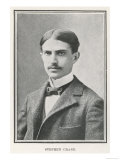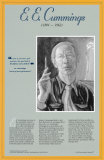|
|
|
|
|
Hart Crane
b. 7-21-1899; Garrettsville, Ohio
d. 4-27-1932; suicide, drown off Florida coast
Modernist poet Hart Crane's most ambitious work is “The Bridge”, which has influenced writers such as Jack Kerouac and Allen Ginsberg.
Hart Crane quotes ~
• “The form of my poem rises out of a past that so overwhelms the present with its worth and vision that I'm at a loss to explain my delusion that there exist any real links between that past and a future worthy of it.”
• “I think the sea has thrown itself upon me and been answered, at least in part, and I believe I am a little changed - not essentially, but changed and transubstantiated as anyone is who has asked a question and been answered.”
• “I got so I simply gagged everytime I sat before my desk to write an ad.”
|
|
|
|
Stephen Crane
b. 11-1-1871; Newark, NJ
d. 6-5-1900; Germany - tuberculosis
(info from a no longer available print) At age 20, author Stephen Crane was ... what he wanted to do with his life. He started writing for newspapers, and it was as a freelance journalist in New York Kity that he saw the rough way of life that inspired him to finish his first novel, Maggie: A Girl of the Streets (1893). This harsh story about a young woman who turns to prostitution and finally commits suicide was very controversial. No one would publish it because of this Crane decided to pubish the book at his own expense. Many people considered his second novel, The Red Badge of Courage (1895), to be his greatest work. He tells the story of Henry Fleming, a young Union soldier during the Civil War. Stephen Crane is also known for his short stories such as “The Blue Hotel,” “The Bride Comes to Yellow Sky”, and “The Open Boat,” which tells about his experiences in a shipwreck. In addition, he wrote several books of poetry, including War Is Kind (1899), from which the above quote is an excerpt. Before tuberculosis claimed his life when he was only 29, Crane had produced enough work as a novelist, short story writer, and poet to fill a ---. Toward the end of his life Stepen Crane travelled to Germany to read and recuperate from his failing health. He died there in 1900.
A man said to the universe:
“Sir I exist!”
“However,” replied the universe,
”The fact has not created in me
A sense of obligation.”
War is Kind
• more Stephen Crane posters
• more 19th Century American Authors
|
|
|
|
A. J. Cronin
b. 7-19-1896; Cardross, Scotland
d. 1-6-1981; Switzerland
Physician and author A. J. Cronin is noted for his deep social conscience. His novel “The Citadel” questioned occupational hazards of mining and resulted in a free public health service in Britain.
FYI - the film Billy Elliot is inspired in part by Cronin's 1935 novel The Stars Look Down.
|
|
|
|
Sor Juana Ines de la Cruz
(Joan Agnes of the Cross)
née Juana Ines de Asbaje y Ramirez
b. 11-12-1651; near Mexico City, Mexico
d. 4-17-1695 (plague?)
Self-taught scholar and poet Sor Juana Ines de la Cruz was an early feminist, choosing to live as a nun in a convent, the only refuge for a female who wished to study. Eventually silenced by the church and forced to sell her library, she died of a plague epidemic.
Sor Juana Ines de la Cruz ~
• “Ah stupid men, unreasonable in blaming woman’s nature, oblivious that your acts incite the very faults you censure.”
• Poems, Protest, and a Dream: Selected Writings
|
|
|
|
Countee Cullen
b. 3-30-1903; New York or Baltimore
d. 1-9-1946
Countee Cullen was a celebrated writer who wrote some of the most beautiful and beloved poems of the Harlem Renaissance. Little is known about his early life. Born Countee Porter, he was raised in New York City by a woman who was probably his grandmother. She died when he was 15 years old, and he was adopted into the home of Reverend Frederick Ashbury Cullen, the pastor of one of Harlem's biggest churches. Countee took the last name of his new family. While he was attending DeWitt Clinton High School he became well known for his poetry. One of only a handful of African American students at Clinton, Cullen won honors in five different subjects.
Cullen went on to study at New York University where his poetry won him both awards and friendships in Harlem's writing community. Before he graduated college with honors in 1925, he had signed a contract to publish his first book of poems, Color. Cullen wrote his poems in very traditional forms such as the sonnet and the lyric ballad, but his themes were far from traditional. He wrote about injustice and prejudice as well as more “classical” topics, and his reputation grew with every new book. Cullen was close with most of the important figures of the Harlem Renaissance, and he was even briefly married to W.E.B. Du Bois' daughter, Nina Yolande.
Cullen wrote several books of poetry, a novel, a popular play, and two children's books. He also taught junior high school. (One of his students, James Baldwin, would grow up to be a famous writer himself.) Countee Cullen died suddenly in 1946, but his legacy lives on: One of the oldest branches of the New York City Public Library is named for him.
• Stars of the Harlem Renaissance posters
• Poetry Forms posters
• Caroling Dusk: An Anthology of Verse by Black Poets in the Twenties, editor Countee Cullen
|
|
|
|
e. e. cummings
b. 10-14-1894; Massachusetts
d. 9-3-1962; New Hampshire
Poster Text: “next to of course god america i love you land of the pilgrims' and so forth oh”
E.E. Cummings was one of the twentieth century's most creative poets, and he is often remembered for his offbeat use of vocabulary and punctuation. Cummings often paid no attention to the rules of grammar and punctuation, sometimes making up completely new words and running words and sentences together. A printer once made a mistake and wrote his name in all lowercase letters. Cummings liked it, and from that time on, he signed all of his work “e.e. cummings.”
Although he is most famous for his poetry, Cummings was also a painter and playwright. His first book of poetry, Tulips and Chimneys, was published in 1923. Before this, he worked as a volunteer ambulance driver in World War One. During this time, he was falsely accused of being on the enemy's side and was imprisoned for three month in a military detention camp. From his experiences there, he wrote The Enormous Room (1922), a fictional account of the cruel forces of war. Some critics say The Enormous Room is one of the best books to come out of World War One era. Edward Estlin Cummings was born in 1894 in Cambridge, Massachusetts and died in 1962 at the age of 67.
FYI - the image in this poster is a self portrait by E. E. Cummings, oil on canvas, 1958.
• e. e. cummings at Amazon.com
• Poetry Forms posters
|
|
|
|
|
previous page | top | next
authors list > a | b |
Cal-Cap | Car | Cas-Caw | Ce-Cha | Che | Cho-Chu | Ci-Cl | Cob-Col | Com-Con | Coo-Coz | CR-CU
| d | e | f | g | h | i | j | k | l | m | n | o | p | q | r | s | t | u | v | w | x-y-z
|
|
I have searched the web for visual, text, and manipulative curriculum support materials - teaching posters, art prints, maps, charts, calendars, books and educational toys featuring famous people, places and events - to help teachers optimize their valuable time and budget.
Browsing the subject areas at NetPosterWorks.com is a learning experience where educators can plan context rich environments while comparing prices, special discounts, framing options and shipping from educational resources.
Thank you for starting your search for inspirational, motivational, and educational posters and learning materials at NetPosterWorks.com. If you need help please contact us.
|
|
|
|












